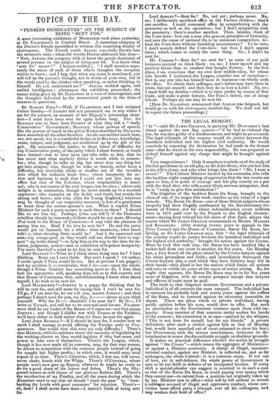THE LEGAL REMEDY.
" Ir "—said Sir JAMES GRAHAM, in parrying Mr. DUNCOMBE'S last thrust against the new Spy system—" if he had so violated the law, he was also guilty of a misdemeanour, and might be prosecuted. The legal tribunals of the country would do justice between the humblest individual and the highest civil authority. He would conclude by repeating the declaration he had made in the former case—that he stood on his own responsibility. He was prepared to defend himself against any charge that might be brought against him."
Very magnanimous ! Only it somehow reminds us of the reply of the fine gentleman in an old play, to Sir John Brute, who catches him in his wife's closet, and asks what brings him there ? " Sir, I wear a sword !" The Cabinet Minister backed by his comrades, who tells the luckless wight complaining of oppression that the law courts are open to him, is in point of courage and fair play exactly on a par with the dead shot, who tells a sand-blind, nervous antagonist, that be is "ready to give him satisfaction ! "
The litigation of the luckless Baron DE BODE, brought to the close of one of its stages this week, teaches us the value of a legal remedy. The Baron DE BODE—one of those British subjects whose property had been illegally confiscated by the Revolutionary tri- bunals of France, and for whose indemnification seven millions were in 1818 paid over by the French to the English Govern- ment—having been refused his fair share of that fund, adopts the course which Sir JAMES GRAHAM recommends to Messrs. MAZZINI and STOLZBERG. After wasting twenty years in appeals to the Privy Council and the House of Commons, Baron De BODE, be- lieving, as Sir JAMES GRAHAM says, that " the legal tribunals of the country would do justice between the humblest individual and the highest civil authority," brought his action against the Crown. Since he took this rash step, the Baron has been bandied like a racket-ball from one court to another, for five years. On Monday last, a Jury found all the pleas raised by the Crown-lawyers against his claim groundless and futile ; and immediately thereupon the Crown-lawyers play a card which they have hitherto kept hid in their hands—they plead in bar the statute which limits all actions and suits to within six years of the cause of action arising. So, for ought that appears, the Baron DE BODE may be in for five years more of litigation, with no certain prospect except that lawyers and officers of court must be paid.
The truth is, that litigation between Government and a private individual is of all contests the most unequal. The individual has to measure his probably lank and scanty purse against the coffers of the State, and to contend against an adversary insensible to shame. There are pleas which no private individual, having public opinion before his eyes, would dare to offer. But such an abstraction as the Government ventures upon them with im- punity. Every member of that concrete entity washes his hands of the concern ; his conscience is at ease—quieted by the whisper, "This is not done for myself, but for my friends." A private defendant, after such a verdict against him as that of Monday last, would have marched out of court ashamed to show his face ; but Government, with the utmost nonchalance, intimates its de- termination to renew the discreditable struggle on shabbier grounds.
It makes no practical difference whether the action be brought against " the Crown "—which means the aggregate of Ministers— or against a Minister nominatim. A charge of illegal, unconsti- tutional conduct, against any Minister, is reflected on, and so far endangers, the whole Cabinet : it is a common cause. If not out of love, yet in self-defence, the whole power of Government is sure to be put forth in defence of an inculpated brother. If every shift a special-pleader can suggest is resorted to in such a case as that of the Baron DR BODE, to avoid paying over money which they cannot use—to retreat from a position not originally taken up by any Minister now in office—what will be left undone to screen a colleague accused of illegal and oppressive conduct, whose con- viction must afford party a triumph over all his colleagues, and May weaken their hold of office ?


























 Previous page
Previous page